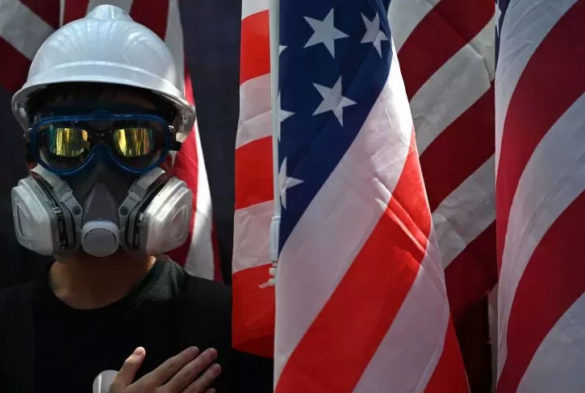
TRUMP SIGNING HONG KONG BILL COULD KILL CHINA TRADE DEAL, ANALYSTS WARN: ‘TENSIONS ARE RISING BETWEEN THE TWO NATIONS’
Hong Kong pro-democracy activists have been lauding Congress for passing new legislation to allow lawmakers to impose sanctions Chinese officials responsible for human rights abuses in the restive territory.
The Senate legislation was passed unanimously on Wednesday. It then passed the House by a 417-1 vote to send it to President Donald Trump’s desk for his signature.
The bill is the culmination of a months-long effort by Hong Kong activists and lawmakers to push a harder U.S. line in support of the unrest in Hong Kong, now nearing its sixth month.
The Hong Kong Human Rights and Democracy Act will also mandate an annual State Department review of the special autonomous status it grants to Hong Kong, which gives the territory beneficial trade treatment.
But analysts have warned that American support for the Hong Kong protesters could imperil a long-sought deal to end the expansive trade war between Washington and Beijing.
China has blamed foreign interference for driving the mass protests in Hong Kong, which began as a movement against proposed legislation that would have allowed fugitives to be deported from Hong Kong to face trial in China.
Opponents argued this would allow Beijing to persecute dissidents living in the former British colony, and undermine the “One country, two systems” arrangement reached before Hong Kong was handed back to Chinese control in 1997.
The protests have since morphed into a wider anti-government movement battling Chinese encroachment into Hong Kong. Aggressive police tactics and government intransigence have resulted in ever more aggressive confrontations between activists and authorities, with no sign of an imminent detente.
Since the start of mass marches in June, the Chinese government has blamed the U.S. and other Western nations of driving the unrest.
The new legislation will only bolster this belief and make a trade deal—which Trump has claimed is close at hand—less likely.
Trump has threatened another $150 billion in tariffs if the two sides cannot reach a so-called “phase one” agreement by December 15.
Henrietta Treyz, a director of economic policy at the Veda Partners investment firm, told The New York Times that his signature on the Hong Kong legislation could torpedo that timeline.
“Tensions are rising between the two nations, not dissipating,” she explained. “The prospect of not reaching a deal and requiring escalation from here remains quite real.”
Michael Pillsbury, a Hudson Institute academic who advises the Trump administration on China, also told the newspaper that the Hong Kong legislation will inform discussions within the Chinese Communist Party as to their U.S. strategy.
“There’s an ongoing debate in Beijing between reformers who would like phase one and hard-liners who see themselves surrounded by hostile forces led by the United States, including in Hong Kong,” he told the Times.
But Hong Kong pro-democracy activists are celebrating regardless. The signed legislation would be strongest international support given since the protests erupted. Tens of thousands have marched on the U.S. consulate in Hong Kong to call for the passage of the bill, and American flags are a common sight at mass demonstrations.
Pro-democracy organization Demosisto—co-founded by prominent activist Joshua Wong—wrote on Twitter, “Thank you everyone — in Hong Kong and Washington — for all the hard work.”
Samuel Chu, the managing director of the U.S.-based Hong Kong Democracy Council, said in a statement sent to Newsweek that he was “deeply and personally moved by the actions in Congress this week.”
“I know Hong Kongers can hear and feel the strong support and backing of the U.S. from today’s bipartisan votes,” he added.
“Hong Kong’s autonomy will not disappear under a cloud of tear gas; its rule of law will not suffer ‘death by a thousand cuts’ by the Chinese Communist Party’s threatening pronouncements; and its human rights and democratic aspirations will not be deterred by mass arrests or languish in political prisons.”